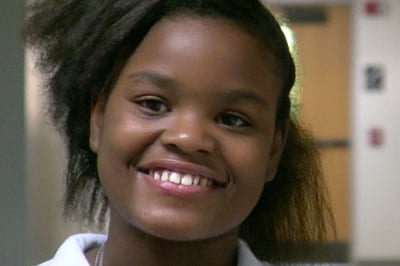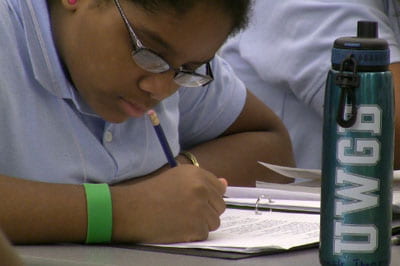 For a dozen middle schoolers who attended a first-time academic summer camp at UW-Green Bay, looking back was important.
For a dozen middle schoolers who attended a first-time academic summer camp at UW-Green Bay, looking back was important.
Looking forward, even more so.
[youtube id=”-WhvBuVM2xw” width=”400″ height=”300″]
The weeklong residential experience, “The Phoenix Scholar Institute for African American Girls,” is a program designed to close the academic achievement gap, and to address educational imbalances. Black students tend to be overrepresented in special education courses, and remain underrepresented in gifted/talented and Advanced Placement programs, said Juliet Cole, associate director of the Institute for Learning Partnership at UW-Green Bay.
So the institute focuses on academic rigor.
“They’re learning — there’s art history, there’s science, there’s math …” Cole said. “(They’ve) been living in the college environment for one week. They’re already feeling like, ‘I’m a college student.”
The program helps students envision themselves as scholars — not just now, but in the future. And it does so with an appreciation for where they come from. The inaugural program daily studies of the values and principles of Kwanzaa, including umoja/ujima (unity/collective responsibility), kujichagulia (self-determination) and kuumba (creativity).
“That’s the idea — get them to a college environment,” Cole said. “Prepare them, inspire them, teach them their culture, their values — just get them really, really excited about learning.”

The Phoenix Scholar Institute doesn’t do that in a vacuum. The brainchild of the Wisconsin Department of Public Instruction’s Chrystyna Mursky and the Green Bay School District’s Shirley Paulson, the institute is a collaborative effort of UW-Green Bay, the school district and community mentors. Funded by DPI, it exists to complement current pre-college programs, including Advancement Via Individual Determination (AVID), Phuture Phoenix and TRIO/Pre-college.
What’s more, Cole says, the institute teaches girls self esteem — a sometimes-daunting task at an age when feeling pride in oneself can be a challenge. So the program includes cultural lessons, and teaches girls about black history — especially black female history.
“These kids need to learn about their roots, their culture, and feel proud about it. So we’re doing a lot to make them feel good about who they are,” Cole said. “And we’re doing a lot to be very culturally responsive, with African American values and principles and culture.”
By mid-week, those lessons already were resonating with Fantasia Joyner, a soon-to-be seventh-grader at Green Bay’s Edison Middle School.
“We’re also learning how we’re important in the world,” Joyner said, “and how to accept ourselves for who we are, and not let others put us down.”
Those lessons are conveyed in several ways, organizers say, from sharing proverbs and stories to showing videos and bringing in speakers.
“We have a lot of African American speakers, successful professionals,” Cole said, “so they can see them and go, ‘You know what? They’re people like me.’ … That’s to give them those role models that they don’t see.”

Goal-setting also is a critical part of the program, helping students envision a bright future and how they’ll make it happen. Program organizers plan to follow up with the girls after the program, continuing to encourage and support their educational goals.
“I want to be a teacher when I grow up,” said Alexsus Moore-Farmer, a soon-to-be eighth-grader who is new to the Green Bay area.
“I want to be a business lawyer,” said Taylor Thomas, who will be in eighth grade at Edison. “You have to know a lot of things to be a lawyer.”
As for Joyner, time will tell.
“Well, I’ve got a lot planned,” she said with a broad smile. “I want to be a lawyer, actually, so I can help people in need. But I also love kids, so I’m thinking about being a teacher, or a pediatrician, or something like that.”
It’s something she wants to do for herself, and also her family.
“I think by going to college, it makes your parents proud,” Joyner said. “And the opportunities that I have today, my mom didn’t have.”
A jam-packed week of activities included the academic and cultural lessons, along with etiquette, nutrition, dance and more. Organizers aim to be comprehensive with the program, which is the female counterpart to a similar program for boys held on campus earlier this summer. Organizers are hoping to launch a similar institute for Native American boys and girls next year, Cole said.
“We feel they are going to come in as just middle school kids,” she said, “(and) they’re going to leave transformed, understanding their values, their culture, their principles, their history.
“When you know where you are coming from, then you can know where you are going.”
(This text closely approximates the embedded video’s audio content, including narration and interviews, and may include additional detail.)

